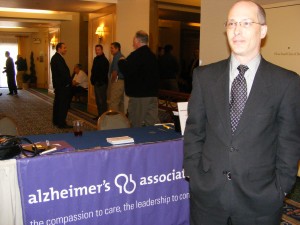
By year 2015, nearly half of the nation”™s workforce will be in a care-giving role serving a full spectrum of diseases.
Besides the emotional toll on caregivers, it can take a financial toll on the companies that employ them.
Alzheimer”™s and other dementias cost American businesses $61 billion a year.
Unpredictable hours worked, frequent interruption and instability of schedule of caregivers are all factors affecting a company”™s revenue.
“What this says to me is this is a productivity issue,” said Matthew Baumgart, senior director of government affairs for the Alzheimer”™s Association, during a recent symposium covering the impact of the disease on businesses and communities at the Holiday Inn in Mount Kisco. “I know, on a small scale, when I have a turnover”¦ there”™s a very steep learning curve every time you cut back or have to replace.”
Interestingly enough, a small percentage of caregivers ”“ 15 percent ”“ are the individual”™s actual spouse. This indicates that an employee”™s marital status has little or nothing to do with his or her responsibilities for care.
“Of Alzheimer”™s and dementia caregivers who are in the workplace and employed, 70 percent of men and 60 percent of women had to go in late, leave early or take time off because of their care-giving responsibilities,” Baumgart said.
Some businesses recognize the inevitable impact of this disease of the aging on their work environment and offer flexible scheduling and other allowances to caregivers when needed.
KeyBank”™s Carrie Martinelli, vice president and human resources business partner, spoke of “Mobile at Key,” a program that provides a BlackBerry and laptop to employees that need flexibility.
“You can work from home and you can work remotely, but you have to agree to confidentiality aspects,” Martinelli said. “There”™s a lot of programming out there”¦ we have employee engagement surveys where people can be open and candid about what Key needs to provide for them. We”™ve found our turnover rates have turned in a positive direction.”
Purchase-based PepsiCo has also forged pertinent programs to encourage work-life balance and to address the epidemic of Alzheimer”™s.
“Employees can join a connect group,” said Sue Bondi, a PepsiCo employee, who volunteers her time with company offshoot PepsiCo EnAble. “If an employee has a certain question in reference to Alzheimer”™s, they will call me and I give them detailed information of what they need to do, where they need to go, who they need to contact.”
PepsiCo also allots six months paid personal leave for newborn care or other personal issues, Bondi said.
“You work with your manager,” she said. “We all have problems within our life and that gives you flexibility.”
Real life cases: Alzheimer”™s effect on the caregiver
Both Carrie Martinelli and Sue Bondi within their respective corporations faced the dilemma of caregiving. Here are edited excerpts of their stories:
Martinelli, on accommodating the caregiver: “One employee became assistant to one of the presidents we had in the region. She was a hard-working person, used to coming in early, staying late, there was not a thing she did not want to do ”“”“ the consummate professional. I started to notice that she seemed to be a little unraveled in the mornings, she was wearing her worries on her face and that was not the type of person I”™d known for eight years”¦ her husband had the early stages of Alzheimer”™s and she was left to be the primary wallet for the home. She told me she didn”™t know if she could work full time anymore and it pained her inside. She was at a crossroads to give up her job to care for her husband. I said, ”˜Okay, we”™ll get you a laptop.”™ It actually costs us less as an organization for her to be working remotely. I said, ”˜Let”™s define late. Let”™s define early.”™ From there, we worked out a schedule. Now, I had something else to manage. The perception of the rest of the team as to why she was allowed to come and go. I thought I”™d need to over explain why I allowed the agreement to happen. But instead, everybody was really supportive of her and thought to themselves, ”˜If anything ever happens to me in that situation, I hope they take care of me.”™”
Sue Bondi, on being a caregiver: “I”™ve been the caregiver. My father had Alzheimer”™s and my mother has emphysema and CoD. My family members did not help me out at the time. I was very stressed, I work a full-time job, I clean two houses and I cook for seven people. PepsiCo has been very flexible with the technology we have today. I can perform my job anywhere, so I was able to work from home a few days a week to take care of doctors”™ appointments, etc. Our president and CEO (Indra Nooyi)”¦ gave us holiday hours and summer hours where we can work a little extra Monday through Thursday and take a half day Friday. When she tells us, “Why are you working late? Tomorrow”™s another day,” this is coming from someone who”™s spent many hours a week away from her family, who has missed a lot. She wants to give back and by doing that, she”™s empowering us. As many times as I close my laptop and say, tomorrow”™s another day. The healthier you are, the more productive you are for them. I became an advocate for Alzheimer”™s. When my father died, my fight was over.”



















